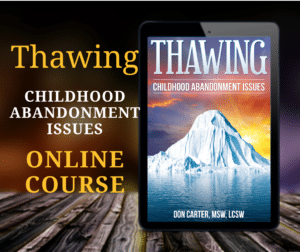
Relationship Mind Games
Relationship mind games are played by innocent people who have very little idea how they continually find themselves in such dramas. Consciously, most of us vow never to participate in mind games… especially if we’ve been through a bad relationship experience. Click the image below to view a video on the game of all games! (All of the other mind games listed here are a variation of this one game – the Drama Triangle.) But, in reality, we are destined to play the relationship mind games that are recorded in our implicit memory as subconscious programs that run automatically.
Mini Course: Moving Out of “The Hood”
Subconscious Synchronization of Love Maps
We are also destined to choose our partner partially based on their abilities and skill at playing the games we know how to play. We make our selection through a subconscious “audition” of sorts — a process I refer to as the subconscious synchronization of compatible neural networks.
An important distinction about relationship mind games needs to be made right up front: There is a type of game that is played in relationships that is NOT a relationship mind game at all — It’s a game consisting of angular transactions called the “Con” game. The initiator of a Con game is fully conscious of their game while their “patsy” is unaware — until they get wise to it or catch the Con red-handed. These are not the games we are concerned with here… That’s for another time and another page.
Relationship mind games are not always a bad thing… For example, early in the courtship stage of a new relationship “flirting” is a fun and satisfying game that does no harm. For some couples in which both partners agree on the boundaries, flirting with others at a party or social gathering is viewed as harmless and acceptable to the partners, then, a mind game is not being played because they are fully aware of it.
But — to the party being flirted with — it may be a relationship mind game called RAPO if that person is not aware that there are boundaries and is being lead to believe it could go further. Some couples even go further than flirting with sex games, which is their choice as consenting adults — but these are NOT relationship mind games because they are consciously discussed and agreed upon by all parties.
Because true intimacy is not always possible in every context (at work with your boss) and with every person (the man on the street) the ability to participate in mind games as valid and necessary. Those who have few true intimacy skills have no choice but to play relationship mind games…or be alone. In these cases, learning the games we play so that we can choose harmless ones and/or develop intimacy skills can do a world of good.
Games that cause pain and wreck relationships are the ones that need to be identified and brought into conscious awareness so they can be stopped and replaced — either by learning true intimacy skills or choosing games that do not cause harm to either party.
List of Relationship Mind Games
Key Point: In TA and in these pages we use labels to describe games and the roles that people play in these games… the labels are NOT for describing people. We are much more than the roles or the games we are programmed to play.
Also, keep in mind that the games are outlined in highly general terms. Everyone is unique and so each plays their favored games in personalized and varied ways.
Below is a partial listing of relationship mind games…
- “If It Weren’t For You…”
- “Now I’ve Got you, you SOB…” and “Kick Me”
- “See what you made me do…”
- “Frigid Woman/Man”
- “Uproar”
- “Courtroom”
Eric Berne, the originator of TA, preferred short phrases to describe games rather than clinical terms. Below is our first example, it was the second couples game identified in a long string of games.
“If It Weren’t For You…” (IWFY)
In a relationship mind game of IWFY a generally insecure or passive person subconsciously chooses a domineering partner who restricts her/his activities….usually the female partner is the one restricted.
Perhaps the player selects a domineering partner because s/he does not like to take risks and try new things, such as taking up photography or going back to school… The domineering partner’s controlling nature keeps the player from getting into frightening situations — perhaps for fear of failure or fear if success — it gives the player an “out” or a way to “save face” and not have to take the risk.
By staying unaware of his or her part in the game, through the use of repression or suppression, the player’s complaints of “If it weren’t for you…” keeps her partner feeling uneasy and gives the player various advantages in the relationship — i.e., a “card to play” in a disagreement etc.
- Possible Payoffs: Confirmation of existential position: “I’m okay, men/women are not okay”Elimination of having to confront personal fears allows him/her to join in the Pastime of “If it weren’t for her/him…” with family and friends thereby structuring time and obtaining strokes
- Roles — Primarily Victim, Sometimes Persecutor
- Ego States: Child to Parent
“Now I’ve Got you, you SOB…” (NIGYSOB) and “Kick Me”
In a relationship mind game of NIGYSOB, the player selects a partner who frequently plays “Kick Me”… The NIGYSOB player is Externalising contempt and hostility while the partner who plays “Kick Me” Internalizes it. When played by a couple, the game is usually triggered suddenly when — for various possible “reasons” — the NIGYSOB player flips into a fit of rage over a perceived slight made by the “Kick Me” player.
The “Kick Me” player knows from frequent experience what the buttons are that trigger the NIGYSOB player (usually jealousy and/or rage), yet cannot seem to keep from pushing them… It genuinely seems to be an “accident” to the “Kick Me” player because, like all games, it’s a relationship mind game played by the Child ego state at a subconscious level.
For example, The NIGYSOB player is in one of “those moods”, there is silent anger and the air feels thick with tension… The “Kick Me” player chooses the worst moment to ask a “harmless” question such as, “What have I done now?”… to which the NIGYSOB player flies into a 30-minute rage about how “Everything always has to be all about you!! I can’t seem to do anything to your satisfaction!!”
-
- Possible Payoffs (NIGYSOB): Confirmation of existential position: “I’m okay, men/women are not okay”, “Men/women can’t be trusted” Justification for inability to control rage and abusive behavior. Avoidance of personal issues causing the rage by focusing on the other person. Projection of disowned aspects of self Habitual behavioral pattern to create intense stimulation — negative strokes is familiar.
- Roles — Persecutor claiming to be a Victim
- Ego States: Critical Parent, Child
- Possible Payoffs (Kick Me): Confirmation of existential position: “I’m not okay, men/women are not okay”, “I’m not ok, you’re ok.” Reenactment of Parent/Child relationship from childhood — provides stimulation and intensity Initiates another game called “Why does this always happen to me?”Obtains negative strokes through familiar emotional themes of childhood — abandonment, shame, contempt.
- Roles — Victim
- Ego State: Child to Parent
“See what you made me do…” (SWYMD)
In a mild form of the relationship mind game of SWYMD the player, feeling unsociable becomes engrossed in some activity which tends to insulate him/her from people. When a family member interrupts by coming into the room or calling out to ask for something the player’s startle response causes the hammer to slip injuring a thumb, or they hit the wrong button on their keyboard and lose their work, or they spill the fuel they were transferring to another container.
The player responds to any one of the above by angrily crying out “See What You Made Me Do!!” — Of course, it’s the player’s own irritation that causes the slip or mistake. When this pattern happens only very occasionally it is not a game. But if it tends to reoccur frequently then the player’s family learns to leave the player alone when they are engrossed.
In a more intense form, SWYMD can become a way of life rather than merely a protective mechanism. The player may spend more and more time engrossed in work or an activity rather than relating with her/his family.
- Possible Payoffs: Confirmation of existential position: “I’m okay, others are not okay, not safe, not to be trusted, etc.” “I am blameless”Avoidance of connectedness and the risks associated with intimacy”Justifiable” anger offers a good excuse for avoiding sexual relations.
- Roles — Victim, Persecutor
- Ego States: Child to Child
This is almost always a marital relationship mind game in which the overt player is usually, but not always, the wife…the Husband is usually a covert player. The husband makes advances to his wife that are rejected under the grounds that “all men are selfish — all they ever want is sex and are incapable of loving her for herself”. He backs off for a time and is again rejected on his next attempt.
Eventually, the husband resigns himself and makes no further advances. As time passes, and no attempts are forthcoming, the wife begins to be provocative. She runs around half dressed and “forgets” a clean towel when taking a shower so asks him to bring one to her. If she plays a severe form of the game she may become flirtatious with other men in her husband’s presence. He eventually responds to these provocations and is again repulsed — a game of “Uproar” follows.
The husband redoubles his efforts to resist what he perceives as a trap and does not respond to her provocations. She eventually turns up the heat by beginning to approach him with kisses. He resists until nature takes its course one day whereby she cries — “See what did I tell you! Men are selfish, all I wanted affection, and all you are interested in is sex!”
The husband has selected this person as his mate for a reason … he is just as afraid of sex as she is. This relationship mind game minimizes the danger of overtaxing his disturbed potency, which he can now blame on her.
- Possible Payoffs: Confirmation of existential position: “I am pure, men are dirty” “I’m ok, you’re not ok”Avoidance of sexual relations – fears exhibition and/or penetration. Obtains internal positive strokes by following expressed or implied parental injunctions that “sex is dirty”
- Roles — Victim (Proper wife – Inconsiderate Husband)
- Ego States: Conscious/Social = Parent to Child Subconscious/Psychological = Child to Parent
This relationship mind game is played by any two people trying to avoid unwelcomed sexual arousal. In the marital pair it’s the end phase of a relationship mind game of Frigid Woman/Man. But the classical game of “Uproar” is a three-handed game usually with a domineering father, teenage daughter, and sexually disinterested/inhibited mother.
NOTE: In order for this to qualify as a game it’s a frequent occurrence, not just an occasional incident…
Course of the game: Father comes home from work and gets into a fight with his daughter. He may have started the fight by criticizing her or she may initiate the fight by being obnoxious or disrespectful…there’s an escalating exchange of angry words that end with the slamming of a bedroom door — by either or both parties. Mother’s role may be as a mediator or referee when she is present.
There is an adjustment period between fathers and daughters when she hits puberty. Sexuality becomes more of a factor. When there is an inhibition of sexual release between mother and father this can pose a problem. Sexual energy runs very deep as it’s part of the survival instinct. The sex drive creates this energy and there must be a healthy outlet for things to proceed well in families. Anger and slamming doors may become the only way some fathers and daughters can live together. The slamming of the bedroom door can subconsciously signify… “I have my bedroom you have yours”.
Many women have experienced a great deal of hurt and confusion when they turned 12 or 13 years old because… “Something just suddenly changed between us — It was like he didn’t want anything to do with me anymore.” Fathers can be just as clueless about this change due to the subconscious nature of the game. Many times they can become controlling and jealous of their daughters dating and social life and not know why. If these family dynamics are present it’s a good idea to get into marital counseling and deal with the issues that are preventing healthy intimacy.
- Possible Payoffs: Confirmation of existential position: Conscious level — “I’m ok, you’re not ok”; Subconscious level “…somethings not ok” Outlet for “siphoning off” sexual tensions. Termination of a relationship mind game of Frigid Woman/Man between husband and wife Satisfies hunger for stimulation and/or intensity Acting out familiar cycles of Abandonment, Shame, and Contempt to obtain negative strokes
- Roles — Victim, Persecutor, Rescuer
- Ego States: Conscious/Social = Parent to Child Subconscious/Psychological = Child to Child
This relationship mind game is played frequently when a couple first begins marital counseling. The therapist must refuse to get pulled into this game by redirecting the couple away from it or nothing will be resolved.
In counseling or not… if this game is in play, conflicts will increase in frequency and intensity with only an occasional ceasefire. Nothing will ever be resolved and matters will only get worse.
It would be helpful for you to read the Contemplation Stage of Change before proceeding here. Then come back and read the description of this game to get a full appreciation of it.
Courtroom can be played by any number of people but is essentially a three-handed game with a Prosecutor, a Defense Attorney, and a Judge. The couple take turns prosecuting each other in front of a judge — a therapist, or a talk-show host (there’s a jury in this case — the audience), or anyone else who is willing to preside over the case.
One partner starts “sharing their feelings” by ripping their partner on a whole litany of issues. When their partner does get a chance to squeeze in an explanation the prosecutor ignores it and rips off another “count” of the offenses on the list.
When it’s time to let the other person “share their feelings” they repeat the same pattern…on and on it goes. Nothing ever gets resolved because the relationship mind game never gets broken up. These exchanges can go on for so many years that the couple forgets what the original issues were.
As outlined in the Contemplation Stage of the Change Process, it is very important for each partner in the relationship to be their own prosecutor, defense attorney, and judge.
Part of a good prosecution would be the fact-gathering investigation of interviewing witnesses — in this case your partner. Finding out how they feel, what they think, and what they have experienced is good data for the judge to have. A good marital therapist is not a judge or referee…s/he is more helpful if seen as a coach or mediator who helps negotiate the rough spots. With this approach conflict resolution and healing can occur.
- Possible Payoffs: Confirmation of existential position: “I’m always wrong” expressed by the excessive need to be right — Reaction Formation. Projection of guilt Excused from guilt Avoidance of the real issues — lack of intimacy for whatever reason Satisfies stimulus hunger and need for intensity. Acting out familiar cycles of Abandonment, Shame, and Contempt
- Roles — Victim, Persecutor, Rescuer
- Ego States: Conscious/Social = Adult (This is what s/he did to me…) to Adult (This is what really happened…) Subconscious/Psychological = Child (Pick me, take my side) to Parent (You’re both right)





